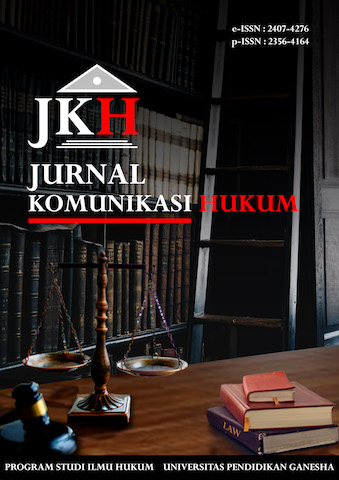STUDY OF BALINESE CUSTOMARY LAW ON INHERITANCE RIGHTS OF CHILDREN FROM INTERFAITH MARRIAGES
DOI:
https://doi.org/10.23887/jkh.v9i1.55349Abstract
This study aims to determine (1) the study of Balinese customary law on the inheritance rights of children born from interfaith marriages; (2) the status of the heirs of children born from interfaith marriages; and (3) legal consequences for the heirs of children born from interfaith marriages (a case study in the village of Alatgker, District of Buleleng, District of Buleleng). This type of research is an empirical juridical research with a basic research scheme, using a method with a statutory approach and a conceptual approach. sources of primary and secondary legal materials. Legal material collection techniques are carried out by: document studies, field observations (observations), and interviews. The research location is in the village of… using a qualitative descriptive analysis of legal materials. The results of the study show that interfaith marriages in the Marriage Law in Indonesia are not explicitly regulated in the Marriage Law Number 1 of 1974 concerning Juncto Marriage, Law Number 16 of 2019 concerning amendments to the Marriage Law Number 1 of 1974 concerning Marriage. The Marriage Law requires couples of different religions if they want to marry, they must submit to the religion of one of the parties. As for the inheritance rights of children born from marriages of couples of different religions according to Balinese customary law, if the child follows his father's religion, he will be given the right to inherit. However, if the child follows the religion of his mother, he will not get the right to inherit. This is based on that the Balinese customary inheritance law adheres to the limeusa principle (father line) and inheritance is not only in the form of rights but also certain obligations that can only be carried out by heirs of the same religion as the heir.
Downloads
Published
How to Cite
Issue
Section
License
Authors who publish with this journal agree to the following terms:- Authors retain copyright and grant the journal right of first publication with the work simultaneously licensed under a Creative Commons Attribution License that allows others to share the work with an acknowledgement of the work's authorship and initial publication in this journal.
- Authors are able to enter into separate, additional contractual arrangements for the non-exclusive distribution of the journal's published version of the work (e.g., post it to an institutional repository or publish it in a book), with an acknowledgement of its initial publication in this journal.
- Authors are permitted and encouraged to post their work online (e.g., in institutional repositories or on their website) prior to and during the submission process, as it can lead to productive exchanges, as well as earlier and greater citation of published work (See The Effect of Open Access).
Authors who publish with this journal agree to the following terms:
- Authors retain copyright and grant the journal right of first publication, with the work [SPECIFY PERIOD OF TIME] after publication simultaneously licensed under aCreative Commons Attribution License that allows others to share the work with an acknowledgement of the work's authorship and initial publication in this journal.
- Authors are able to enter into separate, additional contractual arrangements for the non-exclusive distribution of the journal's published version of the work (e.g., post it to an institutional repository or publish it in a book), with an acknowledgement of its initial publication in this journal.
- Authors are permitted and encouraged to post their work online (e.g., in institutional repositories or on their website) prior to and during the submission process, as it can lead to productive exchanges, as well as earlier and greater citation of published work (See The Effect of Open Access).












